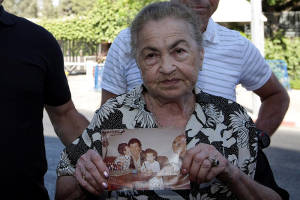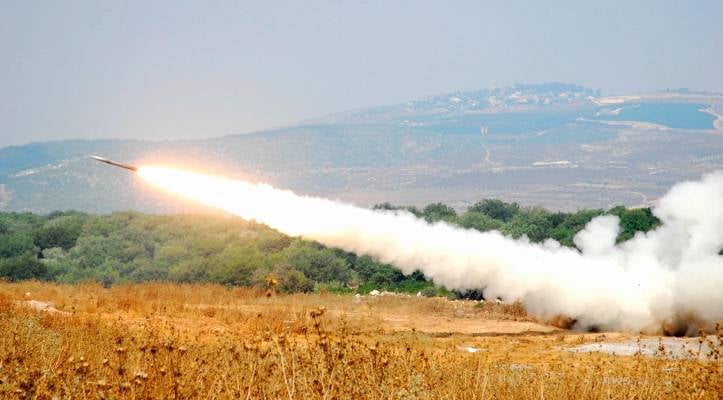Hours after the death of Hezbollah terrorist Samir Kuntar, who was targeted on Sunday in an Israeli Air Force strike, rockets from Lebanon landed in northern Israel. There were no injuries reported.
Alarms sounded throughout the city of Nahariya and several Israeli towns located near the Lebanon border on Sunday night when at least three rockets landed in an open area. There were no injuries reported.
Since the killing of terrorist Samir Kuntar early Sunday morning in Syria, Israel has been on alert for a potential response from Hezbollah, the Lebanon-based Palestinian terror organization. Rumors several months ago of Kuntar’s death were proven false.
“The IDF and Israel definitely need to be prepared for the possibility of retaliation by Hezbollah,” Member of Knesset Eyal Ben-Reuven said in an interview with TPS. Ben-Reuven had served the IDF for 35 years and was deputy chief of the Northern Command during the Second Lebanon War.
“I suggest taking the Hezbollah threat seriously. Their announcement directly blaming the Israeli government shows that they are not going to hide this [killing], like they have done in the past,” he said.

Terrorist Samir Kuntar (L) with Hezbollah leader Hassan Nasrallah. (AP)
Ben-Reuven added, however, that he does not foresee any drastic or major response coming from Hezbollah. “My estimation is that they will not do something that can make the situation deteriorate into total chaos. They are preoccupied with other fronts, such as Syria,” he said.
Hezbollah has used significant resources and manpower in the Syrian civil war in an attempt to help Syrian President Bashar al-Assad maintain power. Reportedly, a third of Hezbollah’s fighters were killed in the fighting.
Indeed, retired Lebanese General Hisham Jaber told Daily News Egypt Sunday that he expected a response from Hezbollah, but he “excluded the suggestion that Hezbollah would violate UN resolution number 1701 that called for a ceasefire between Hezbollah and Israel in 2006.”
“They might respond with what is called a ‘threshold operation, for example, an explosive device on the border fence, or firing an anti tank missile, or firing a rocket at an Israeli target,” Ben-Reuven suggested. “Such an operation wouldn’t draw a severe response from the IDF, which would again force them to retaliate, causing the situation to snowball.
Earlier this year, Hezbollah fired an anti-tank missile killing two Israeli soldiers in Har Dov near the Lebanese border, in retaliation for an alleged Israeli strike about a week earlier that killed several members of both the Iranian Revolutionary Guard and Hezbollah.
No Change in Routine for Residents
Meanwhile, Israeli residents living on the Lebanese border continued to function regularly on Sunday in the face of potential terror attacks and reprisals. “Currently there are no special preparations, and there have not been any new instructions received from security officials,” Giora Zaltz, head of the Upper Galilee Municipality, told TPS. “Children went to kindergartens and schools, and their parents went to work this morning.”
“The public here practices for [potential] emergency situations, and if we will be required to transition from a routine situation to an emergency situation due to an attack on Israel, we will do so according to familiar drills to us from the past. We trust the army,” he said.
A Serious Dent in Hezbollah
The elimination of Kuntar seems to have created a significant dent in the Hezbollah terrorist organization. “Since he was released in 2008, he hasn’t stopped operating for one moment, and when Hezbollah started operating in Syria [during the Syrian civil war], he began operating from Syria, establishing a foundation for the organization,” Ben-Reuven explained.

Nina Keren holds photo of son and granddaugher murdered by Samir Kuntar in 1982. (Kobi Gideon/Flash90)
“If you add the horrific attack for which he served many years in prison, and all his other operations as part of Hezbollah in recent years, this answers the question of why, now, he deserved to die,” he added. “He’s a terrorist operating for Hezbollah, and he’s an enemy of Israel, an active enemy that produces terror.”
Ben-Reuven also said that the killing of Samir Kuntar should serve as a message to other terrorists.
“The meaning of the operation is that no terrorist is immune, and everyone should be aware of this,” he stressed. “Even if he has served in Israeli prison, he returned to terror and was eventually targeted. “Whether it was Israel or not who killed Kuntar, terrorists need to be aware and understand this.”
By: Anav Silverman, TPS News Agency
(With files from United with Israel)
